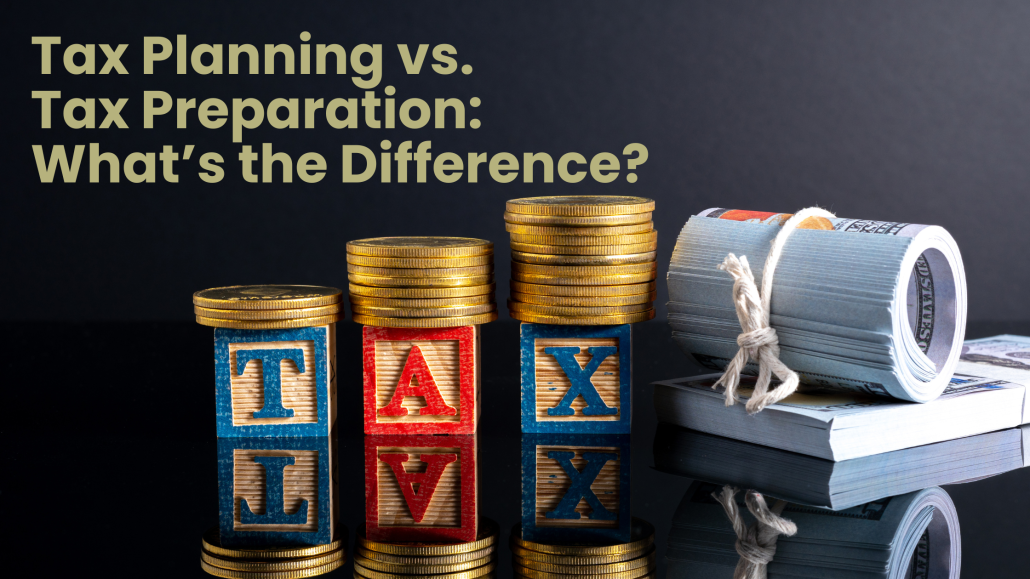
Taxes can feel like a chore— another task to check off before the deadline. But if you’re only focused on filing your return, you might be leaving money on the table. While tax preparation is essential for staying compliant, tax planning helps you look ahead and make decisions that reduce what you owe. It’s not about working the system; it’s about working within the system to keep more of what you’ve earned.
Let’s break down the difference between tax preparation and tax planning—and why taking a proactive approach can make a big difference to your bottom line.
What is Tax Preparation?
Tax preparation is the process of gathering all your financial information, completing your tax forms, and filing them with the IRS or your state tax agency. It’s the part of tax season most people are familiar with—often accompanied by a scramble to find receipts and a few late nights trying to make sense of deductions.
What Tax Preparation Involves:
- Reporting your income, expenses, and any deductions or credits
- Completing and submitting federal, state, and local tax returns
- Making sure everything complies with current tax laws
- Calculating whether you owe taxes or qualify for a refund
Tax preparation is necessary, but it’s focused on the past. You’re documenting what already happened, not shaping what’s ahead.
What is Tax Planning?
Tax planning is a forward-thinking strategy. It’s less about paperwork and more about making informed financial decisions that can reduce your tax bill over time. Think of it like a financial GPS—it helps you map out the best route so you don’t end up paying more than you need to.
What Tax Planning Involves:
- Reviewing your income, investments, and expenses for potential savings
- Timing your income and deductions to maximize tax benefits
- Structuring your finances to minimize taxable gains
- Preparing for life events like buying a home, starting a business, or retiring
Tax planning isn’t just for the wealthy or for big businesses. It’s for anyone who wants to be more intentional about their money and avoid unpleasant surprises when tax season arrives.
Why Proactive Tax Planning is Key to Reducing Your Tax Bill
- Maximizing Deductions and Credits
Certain deductions and credits require action before December 31. For example, if you want to claim a deduction for charitable donations, you need to make those contributions within the calendar year. Without planning, you might miss these opportunities entirely. - Timing Income and Expenses Wisely
If you know you’ll be in a higher tax bracket next year, you might consider deferring income to stay in a lower bracket now. Or, if you expect your income to decrease, it might make sense to accelerate certain payments or expenses to maximize deductions. - Avoiding Costly Mistakes and Penalties
Nobody likes an unexpected tax bill—or worse, a penalty for underpayment. Tax planning helps you estimate what you’ll owe ahead of time, so you can make quarterly payments if needed and avoid last-minute stress. - Managing Investment Gains and Losses
Investing can have major tax implications. Tax-loss harvesting, for instance, allows you to offset capital gains by strategically selling underperforming assets. But this requires planning ahead—not scrambling to figure it out the week before the tax deadline. - Preparing for Big Life Changes
Life events like getting married, starting a family, or buying property can significantly impact your taxes. Proactive planning ensures you don’t overlook deductions or face surprise tax bills related to these milestones.
Why Working with a Tax Professional Can Make a Big Difference
While DIY tax software can help with preparation, tax planning requires a more personalized touch. Tax professionals don’t just fill out forms—they help you understand the “why” behind the numbers and develop strategies that align with your financial goals.
A good tax professional becomes a partner in your financial journey, helping you make smart decisions that go beyond the next filing deadline.
Tax preparation helps you meet your legal obligations, but tax planning puts you in control of your financial future. By taking the time to plan ahead, you can minimize your tax liability, maximize savings, and avoid the stress of last-minute decisions. Don’t wait until tax season to think about your taxes—start planning today for a more secure tomorrow.


